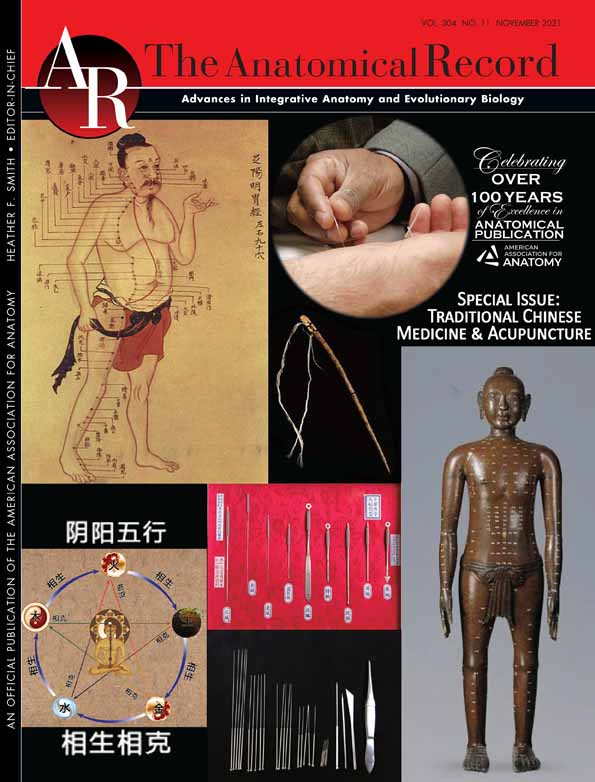Brain diseases
How to submit an article:
- Registered users can submit any published journal article that has a unique DOI (Digital Object Identifier) name or link to Research Hub.
- For example, you can paste the full DOI link:
https://doi.org/10.1109/5.771073or just the DOI name:10.1109/5.771073into the field above and click submit. - The person who is first to submit a valid article to Research Hub will forever be credited for it, and every article submission earns you +6 Research Points.
Published research studies are articles that present the findings of original research that has undergone a peer-review process and has been made publicly available in scholarly journals, books or other media.

Acupuncture for brain diseases: Conception, application, and exploration
2022 Feb 23 The Anatomical Record Gao X, Wang Y, Meng H, Li S, Jiang H, Zhang Z, et al.
In this review, we summarized the current achievements in the field of acupuncture for brain diseases. At present, the fields undergoing an evolution from empirical medicine, EBM to precision medicine, and its conception, application, and exploration have crossed over from the study of traditional experience to the overall understanding of the brain function and biological signals based on interdisciplinary research. In view of the current progress, we are quite confident that acupuncture will inject new vitality into the field of brain research and brain diseases.
Review Article Brain diseases Acupuncture
Walnut intake, cognitive outcomes and risk factors: a systematic review and meta-analysis
2021 Jan 15 Annals of Medicine Cahoon, D., Shertukde, S. P., Avendano, E. E., et al.
Systematic Review Meta-Analysis Walnut Dementia Alzheimer's Disease StrokeThe existing evidence, although with low level of confidence, suggests that walnut intake may have a beneficial effect on cognition-related outcomes, including cognitive function, mood, and stroke.

Beneficial Effects of Walnuts on Cognition and Brain Health
2020 Feb 20 Nutrients Chauhan A, Chauhan V.
Systematic Review Alzheimer's Disease Parkinson's Disease Walnut Brain Health Cognitive FunctionThese reports suggest the benefits of a walnut-enriched diet in brain disorders and in other chronic diseases, due to the additive or synergistic effects of walnut components for protection against oxidative stress and inflammation in these diseases.
Research insights are moderated by the Research Hub team and offer an at-a-glance overview of interesting research findings.

2021 Annals of Medicine
The existing evidence, although with low level of confidence, suggests that walnut intake may have a beneficial effect on cognition-related outcomes, including cognitive function, mood, and stroke.
Systematic Review Alzheimer's Disease Dementia Stroke Walnut
Walnut intake, cognitive outcomes and risk factors: a systematic review and meta-analysis
Cahoon, D., Shertukde, S. P., Avendano, E. E., et al.

2020 Nutrients
These reports suggest the benefits of a walnut-enriched diet in brain disorders and in other chronic diseases, due to the additive or synergistic effects of walnut components for protection against oxidative stress and inflammation in these diseases.
Systematic Review Alzheimer's Disease Brain Health Cognitive Function Parkinson's Disease Walnut
Beneficial Effects of Walnuts on Cognition and Brain Health
Chauhan A, Chauhan V.
Review Articles
Review articles summarise and critically evaluate the current state of research on a specific topic or field by synthesising multiple primary research studies.

Acupuncture for brain diseases: Conception, application, and exploration
2022 Feb 23 The Anatomical Record Gao X, Wang Y, Meng H, Li S, Jiang H, Zhang Z, et al.
In this review, we summarized the current achievements in the field of acupuncture for brain diseases. At present, the fields undergoing an evolution from empirical medicine, EBM to precision medicine, and its conception, application, and exploration have crossed over from the study of traditional experience to the overall understanding of the brain function and biological signals based on interdisciplinary research. In view of the current progress, we are quite confident that acupuncture will inject new vitality into the field of brain research and brain diseases.
Review Article Brain diseases Acupuncture
Walnut intake, cognitive outcomes and risk factors: a systematic review and meta-analysis
2021 Jan 15 Annals of Medicine Cahoon, D., Shertukde, S. P., Avendano, E. E., et al.
Systematic Review Meta-Analysis Walnut Dementia Alzheimer's Disease StrokeThe existing evidence, although with low level of confidence, suggests that walnut intake may have a beneficial effect on cognition-related outcomes, including cognitive function, mood, and stroke.

Beneficial Effects of Walnuts on Cognition and Brain Health
2020 Feb 20 Nutrients Chauhan A, Chauhan V.
Systematic Review Alzheimer's Disease Parkinson's Disease Walnut Brain Health Cognitive FunctionThese reports suggest the benefits of a walnut-enriched diet in brain disorders and in other chronic diseases, due to the additive or synergistic effects of walnut components for protection against oxidative stress and inflammation in these diseases.
Clinical Trials
Clinical trials are research studies that involve people and are conducted to evaluate the safety and efficacy of new treatments or interventions, such as drugs, medical devices, or behavioural therapies.
Study Protocols
Published study protocols are detailed plans that outline the objectives, methodology, statistical analyses, and organisation of a research study that have been made publicly available for others to review and use as a reference.
Presentation Slides

Systematic Review
The existing evidence, although with low level of confidence, suggests that walnut intake may have a beneficial effect on cognition-related outcomes, including cognitive function, mood, and stroke.
Cahoon, D., Shertukde, S. P., Avendano, E. E., Tanprasertsuk, J., Scott, T. M., Johnson, E. J., Chung, M., & Nirmala, N.

Systematic Review
These reports suggest the benefits of a walnut-enriched diet in brain disorders and in other chronic diseases, due to the additive or synergistic effects of walnut components for protection against oxidative stress and inflammation in these diseases.
Chauhan A, Chauhan V.
Executive Summary
Write an executive summary in the form of a blog article on the topic of "Research into Chinese medicine treatment for Brain diseases" summarising the research below and using language that can be easily understood by patients and avoiding medical jargon using a professional and caring tone of voice.
Write an executive summary in the form of a blog article on the topic of "Researched Chinese medicine treatments for Brain diseases" summarising the research below in an objective and easy to understand way, and using language that can be easily understood by patients. Group the article into Chinese medicine treatments first, followed by nutrition and other treatments. Avoid using medical jargon and use a professional and caring tone of voice.
Write me a concise but easy to understand executive summary on the topic of "Chinese medicine treatments for Brain diseases" based on the following research that I will give you. Your summary should be 2 paragraphs long in Australian English spelling and include references to the studies.
A Systematic Review published in 2021 in the journal Annals of Medicine found that The existing evidence, although with low level of confidence, suggests that walnut intake may have a beneficial effect on cognition-related outcomes, including cognitive function, mood, and stroke. The existing evidence, although with low level of confidence, suggests that walnut intake may have a beneficial effect on cognition-related outcomes, including cognitive function, mood, and stroke. Limitations in study design and comparability render the available evidence insufficient to draw a firm conclusion regarding the effects of walnut on cognition in adults. High quality studies and standardized interventions and measurement tools are necessary to determine the role of walnut intake in cognitive health.
A Systematic Review published in 2020 in the journal Nutrients found that These reports suggest the benefits of a walnut-enriched diet in brain disorders and in other chronic diseases, due to the additive or synergistic effects of walnut components for protection against oxidative stress and inflammation in these diseases. Walnuts contain several components that have antioxidant and anti-inflammatory effects. Animal and human studies from our and other groups suggest that supplementation with walnuts in the diet may improve cognition and reduce the risk and/or progression of mild cognitive impairment and Alzheimer's disease. Furthermore, several animal and human studies have suggested that walnuts may also decrease the risk or progression of other brain disorders such as Parkinson’s disease, stroke, and depression, as well as of cardiovascular disease and type 2 diabetes. Together, these reports suggest the benefits of a walnut-enriched diet in brain disorders and in other chronic diseases, due to the additive or synergistic effects of walnut components for protection against oxidative stress and inflammation in these diseases.
Moderation Tools
Topic
Sign In
Users not signed in are limited to viewing the 5 most recent items of content.